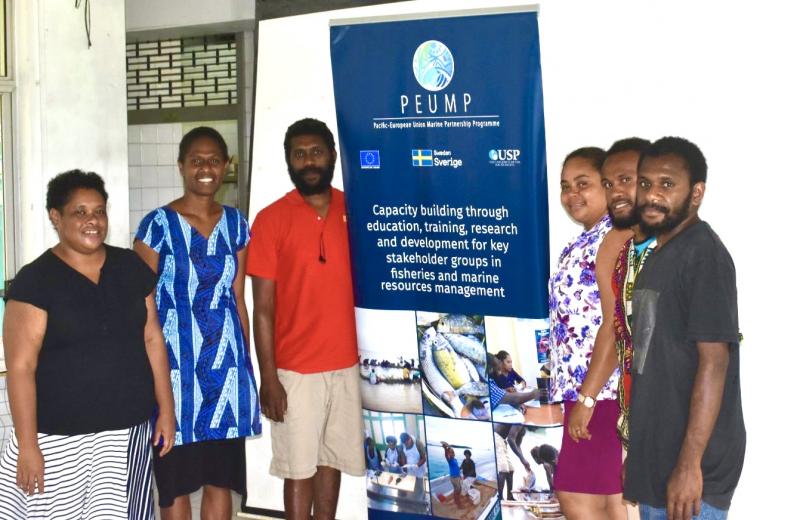
PRESS RELEASE
Coveted seafood business micro-qualification brings a ray of hope to six Ni-Vans
February 3, 2022 Port Vila, Vanuatu–Six Ni Vans have furthered their skills through the highly coveted Micro-Qualification in Establishing and Operating a Small Seafood Business after attending two weeks of face-to-face classes at the USP Emalus Campus, in Port Vila, Vanuatu
They are amongst the first 65 Pacific Islanders of which 38 are women to hold this micro-qualification in the world. This was the fourth regional cohort of the micro-qualification and previously two cohorts of this micro-qualification was held in Fiji and one in the Solomon Islands.
The six participants were awarded scholarships by the University of the South Pacific (USP) Pacific-European Union Marine Partnership (PEUMP) Programme in collaboration with the USP Pacific Technical and Further Education (TAFE).
“Whilst the supply of seafood is readily available, fisherfolk want to shift from traditional to digital marketing to have access to new markets with the evolving situation. This is the gap I can further and confidently fill as a job creator for people seeking to connect through a network of producers and retailers,” said small seafood business entrepreneur Daffodil Tari, a participant in the course who moved into seafood retailing to help fisherfolk in Vanuatu to make a fair amount of living with their catch after previously working in sales and marketing.
School Principal, Davidson Nagof, who is from Maskelyne but stationed at Lini Memorial School said the challenges of the COVID-19 pandemic and climate change have forced his community to regroup and find solutions. Thus setting up a proper business plan by drawing up robust Strengths, Weaknesses, Opportunities, and Threats (SWOT) analysis from knowledge gained from this micro-qualification will aid in his communities recovery.
“In Pentecost Island where I work, the area is far from the Pacific Ocean, but like all Pacific Islanders seafood is top of our palette. My community in Maskeylene relied on tourism but they have been forced to change career paths. They supply me with ocean resources, which I help sell. This small scale business with a proper set up will be the lifeline of my community’s survival,” he said.
University of the South Pacific, Deputy Vice-Chancellor Regional Campuses & Estates, Dr Giulio Masasso Tu’ikolongahau Paunga, in congratulating the awardees said the techniques taught by this micro-qualification helps build the resilience of the 15 Pacific ACP Group of countries to improve their livelihoods with the ability to survive current and future shocks.
“This is why we are very proud of the partnership between the EU, the Swedish Government and USP as through the PEUMP Programme it allows interventions to build capacity through education, training, research and development with poverty alleviation a key consideration. In addition, gender issues and a rights-based approach are mainstreamed throughout the Programme,” he said.
This micro-qualification course focused on the fundamentals of establishing and operating a small seafood business; business models and business plans; marketing strategies; basic accounting; records and operational management; legislative requirements for business establishment; and ongoing compliance. It assists Pacific Islanders to operate their businesses successfully and helps entrepreneurs to establish and operate a new seafood business.
The USP is one of four key implementing partners of the overall PEUMP Programme, an initiative funded by the EU and the Government of Sweden. The USP, as an implementing partner, focuses on building the capacity for Pacific islanders through education, training, research and development in fisheries and marine resources management.
The overall EUR 45million Programme promotes sustainable management and sound ocean governance for food security and economic growth, while addressing climate change resilience and conservation of marine biodiversity. It follows a comprehensive approach, integrating issues related ocean fisheries, coastal fisheries, community development, marine conservation, and capacity building under one single regional action. (ENDS)
For more information:
Josephine Prasad, USP PEUMP Programme, Communications Specialist, +679 9922098, [email protected]
Follow us at @uspimr on instagram,facebook and twitter
About us
The University of the South Pacific (USP) is the premier institution of higher learning for the Pacific, uniquely placed in a region of extraordinary physical, social and economic diversity to serve the region’s needs for high quality tertiary education, research and policy development. One of only two regional universities of its type in the world, USP has 12 member countries: Cook Islands, Fiji, Kiribati, Marshall Islands, Nauru, Niue, Samoa, Solomon Islands, Tokelau, Tonga, Tuvalu and Vanuatu. USP is committed to achieving excellence and innovation for the sustainable development of Pacific Island Countries.